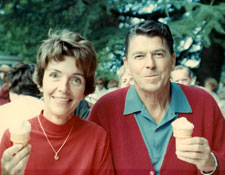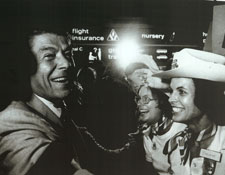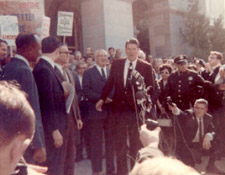| |
 |
| |
Ron & Nancy enjoy ice cream cones in Summer of 1967 at one of
many backyard barbecues & pool parties they held for Staff, Legislators
& their Families at the Governor’s Executive Residence on quiet, tree-
canopied residential street in Sacramento, California.
Photo Credit: Curtis Patrick & Art Van Court collections.
|
More than fifty close and another ten or so, not so close colleagues, friends and staffers who surrounded RR for from two or three years up to thirty five and, in some cases, forty years allowed me to conduct personal interviews with each of them. No subjects were off-limits and each was asked at least two questions which were exactly the same for everyone, Ex: “What did you find were the plus factors in dealing with RR and what were his negatives? What mannerisms, decisions, actions, possible bad attitudes or behavior did RR display which were offensive to you?” “What were his good points? What made you want to know him better, spend time with him, learn from him or watch him function in his various roles as a political leader and, if you agree, a statesman?” What set him apart from others in politics and government---Good or Bad?
Many hit key points but one long-time, respected advisor hit the ZENITH!
Of all of the people I interviewed, the one who was the most calculating, accurate and introspective in clearly explaining the true ESSENCE of RR and the one who plumbed those depths of Reagan’s inner-self and was the most discerning, who could synthesize it best, was nuclear weapons designer, Former Appointments Secretary for Governor Reagan, later U.S. Air Force Secretary, and Special Assistant to President Reagan for National Security Policy, and Author of AT THE ABYSS, An Insider’s History of The Cold War, Random House, 2004: Thomas C. Reed.
The following remarks Tom graciously allowed me to publish to give another facet to RR’s personality, character and ability, the concerns RR deeply felt; but many times kept to himself. Some are stunning in their depth and honesty and present a fresh new under-standing of What Reagan was REALLY Like!
Tom Reed recalls:
“Reagan grew up in the Depression and voted for Franklin Roosevelt. He believed in a safety net to catch those who fell and to protect those who simply could not cope, but he felt strongly such a net should not become a hammock, nor should it ensnare those who wished to fly free. He believed that honesty was not negotiable, that truth was absolute, and that leaders were to lead-not to poll-their constituents. Once you spent a few years listening to Reagan on the stump or over coffee, you knew what his beliefs and policies were. You could do your job secure in the knowledge that they would not change on the morrow.”
“Reagan was also a man of the utmost integrity. He did not run for office for the perks and power, nor did he seek those things in Hollywood. He wanted to live comfortably, to enjoy life, and to pass on a better life to the next generation. He had no shady financial dealings! Reagan did not like complexity. He had no need to prove himself, no urge to be governor, no burning desire for the presidency. He never achieved superstar status in Hollywood. He just wanted to do a good job and do the right things as he saw them.”
| |
 |
| |
1976 GOP
CONVENTION GREETERS
Ron & Nancy arrive at Kansas City Airport for 1976 GOP National Convention,
to be greeted with smiles & cheers from beaming, uniformed Reagan Girls & excited
crowds of well-wishers. Photo Credit: Dennis Warren, Sacramento
|
“Reagan lived in a Sea of Tranquility with a sense of “que sera sera.” Perhaps he was just a laidback southern Californian. Whatever the reason, his sense of confidence, tran-quility, humor and inevitability lowered the stress level wherever he went.”
“Reagan had no friends as most of us use that word. There was no one with whom he would just hang out. (With the exception of Willard “Barney” Barnett, California Highway Patrol officer and confidant---at the ranch). That role was reserved for his horse and the peaceful surroundings of his ranch. Nancy was a very close ally, his dearest love, but not his friend.”
“Confusing Reagan’s lack of ambition and short work day with a willingness to finish second was a lethal mistake for candidates and empires throughout the second half of the twentieth century!”
“What set Reagan apart was his overarching sense of vision and a mental clock-speed that far outran everyone else. He understood how things would work out. Perhaps thinking things through to their logical conclusion is what he did with the time freed up by what others called “laziness.” However he did it, he had a depth and clarity of vision that gave him the confidence to ignore criticism, media abuse and countervailing advice from advisors, cabinet and staff. With this sense of vision he could make decisions quickly, under stress, with the greatest of ease. This is what the Old Sacramento Hands meant when they said, ‘Let Reagan be Reagan.’ They resisted the bureaucracy’s desire to pre-digest every problem into a consensus solution. They had confidence in his vision and his ability to decide.”
 |
|
| |
|
“Reagan’s vision was deployed at a mental clock-speed that always took our breath away! In trying to understand Reagan’s mind you had to understand that it ran twice, or perhaps ten times as fast as the rest of us mortals. This meant that during press conferences, debates, or confrontations Reagan was already parsing the grammar of his response while the questioner was still plodding through the question.”
“Things that Reagan once read stayed there in his mental card-file forever. When they reappeared, we would look on in wonderment and surprise.”
|
|
|
 |
| |
QUOTES FROM RONALD REAGAN
Out of hundreds of famous quotes from Ronald Reagan, the following are even more important, appropriate and critical today than when he first said them:
“Without God, democracy will
not and cannot long endure.”
-Ronald Reagan |
|
 |
|
| |
 |
| |
WHAT STAFF, FRIENDS
AND PROFESSIONALS
SAID ABOUT REAGAN
 “He didn’t need me to do his writing and crafting of speeches and papers. “He didn’t need me to do his writing and crafting of speeches and papers.
I was really amused, because he was brilliant! He was really fun to work
with.”
Dr. Alex Sherriffs, Education Secretary to Governor Ronald Reagan, 1967-1974.Academic Vice-Chancellor California State University & Colleges System. Professor Emeritus U.C. Berkeley, Fifty years+
|
|
 |
|
| |
 |
| |
WHAT HAVE PEOPLE SAID ABOUT THE BOOK - REAGAN: WHAT
WAS HE REALLY LIKE?
“Curtis: I have just finished reading every word of your book, REAGAN:
WHAT WAS HE REALLY LIKE? and want to compliment you on writing a
very interesting, engaging presentation of RR’s political beginnings. He
obviously was a unique, one of a kind, person and you were privileged to
have been involved with his campaigns in his politically formative years.
I found it very interesting that literally all of his early years staff people like
you used the same terms to describe RR, namely: Sincere, Honest, Decent,
of High-Integrity, Funny, Consistent, Intellectual and Likeable. It is a real
tribute for any person to be described as possessing those qualities. Thanks
for a great read!”
Frank Stermole, PhD
Professor Colorado School of Mines, Chemical / Petroleum Engineering /
Investment. World-renowned lecturer. |
|
 |
|
|
 |